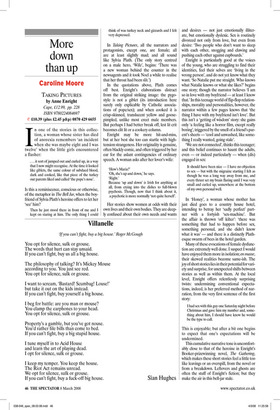More down than up
Caroline Moore
TAKING PICTURES by Anne Enright Cape, £12.99, pp. 228 ISBN 9780224084697 ✆ £10.39 (plus £2.45 p&p) 0870 429 6655 In one of the stories in this collection, a woman whose sister has died of anorexia remembers ‘an incident when she was maybe eight and I was twelve’ when the little girls encountered a flasher:
. . . it sort of jumped out and curled up, in a way that I now might recognise. At the time it looked like giblets, the same colour of subdued blood, dark and cooked, like that piece of the turkey our parents liked and called ‘the pope’s nose’.
Is this a reminiscence, conscious or otherwise, of the metaphor in The Bell Jar, when the boyfriend of Sylvia Plath’s heroine offers to let her ‘see’ him?
Then he just stood there in front of me and I kept on staring at him. The only thing I could think of was turkey neck and gizzards and I felt very depressed.
In Taking Pictures, all the narrators and protagonists, except one, are female; all are at least slightly mad; and all sound like Sylvia Plath. (The only story centred on a male hero, ‘Wife’, begins: ‘There was a new woman behind the counter in the newsagents and it took Noel a while to realise that her throat had been slit.’) In the quotations above, Plath comes off best. Enright’s elaborations distract from the original striking image: the pygostyle is not a giblet (its introduction here surely only explicable by Catholic associations of pope/sex); and when cooked it is crisp-skinned, translucent yellow and goosepimpled, unlike most erect male members. But perhaps I had better break off, lest lit crit becomes clit lit or a cookery column.
Enright may be more hit-and-miss, but at her best she too can startle with hightension strangeness. Her originality is genuine, often blackly comic, and often triggered by her ear for the aslant contingencies of ordinary speech. A woman asks after her lover’s wife:
‘How’s Maria?’ ‘Oh, she’s up and down,’ he says.
‘Right.’ Because ‘up and down’ is Irish for anything at all, from crying into the dishes to full-blown psychosis. Though, now that I think about it, a psychotic is more normally ‘not quite herself’.
Her stories show women at odds with their own lives and their own bodies. They are deeply confused about their own needs and wants and desires — not just emotionally illiterate, but emotionally dyslexic. Sex is routinely divorced not only from love, but even from desire: ‘Two people who don’t want to sleep with each other, snogging and clawing and pushing each other against cupboards.’ Enright is particularly good at the voices of the young, who are struggling to find their identities, feel their selves are ‘living in the wrong person’, and do not yet know what they want. ‘So Natalie put me straight. Who knows what Natalie knows or what she likes?’ begins one story; though the narrator believes ‘I am so in love with my boyfriend — at least I know that.’ In this teenage world of flip-flop relationships, morality and personalities, however, the narrator within a few pages knows that ‘the thing I have with my boyfriend isn’t love’. But this isn’t a ‘getting of wisdom’ story: she gains only ‘a feeling like a horror film, except really boring’, triggered by the smell of a friend’s parent’s sheets — ‘cool and unwashed, like something I really wanted, going stale’.
‘We are not connected’, thinks this teenager; and this belief continues to haunt the adults, even — or indeed particularly — when (dis) engaged in sex:
It should have been nice — I have no objection to sex — but with the migraine starting I felt as though he was a long way away from me, and every thrust set my brain flaring until I was very small and curled up, somewhere at the bottom of my own personal well.
In ‘Honey’, a woman whose mother has just died goes to a country house hotel, intending to betray her ‘sadly perfect’ partner with a fortyish ‘sex-machine’. But the affair is thrown ‘off kilter’: ‘there was something that had to happen before sex, something personal, and she didn’t know what it was’ — and there is a distinctly Plathesque swarm of bees in the hotel garden.
Many of these evocations of female dysfunction are extremely well done. I suspect I would have enjoyed them more in isolation; en masse, their skewed realities become same-ish. The joy of short stories lies in their potential for variety and surprise, for unexpected shifts between stories as well as within them. At the local level, Enright offers relentlessly surprising twists: undermining conventional expectations, indeed, is her preferred method of narration, from the very first sentence of the first story:
I had sex with this guy one Saturday night before Christmas and gave him my number and, something about him, I should have know he would be the type to call.
This is enjoyable; but after a bit one begins to expect that one’s expectations will be undermined.
This cumulative narrative tone is uncomfortably close to that of the heroine in Enright’s Booker-prizewinning novel, The Gathering, which makes these short stories feel a little too like leavings or an overspill, from the novel or from a breakdown. Leftovers and ghosts are often the stuff of Enright’s fiction; but they make the air in this bell-jar stale.


















































































 Previous page
Previous page